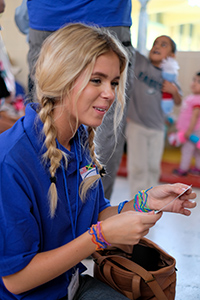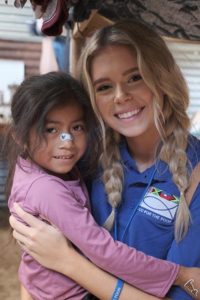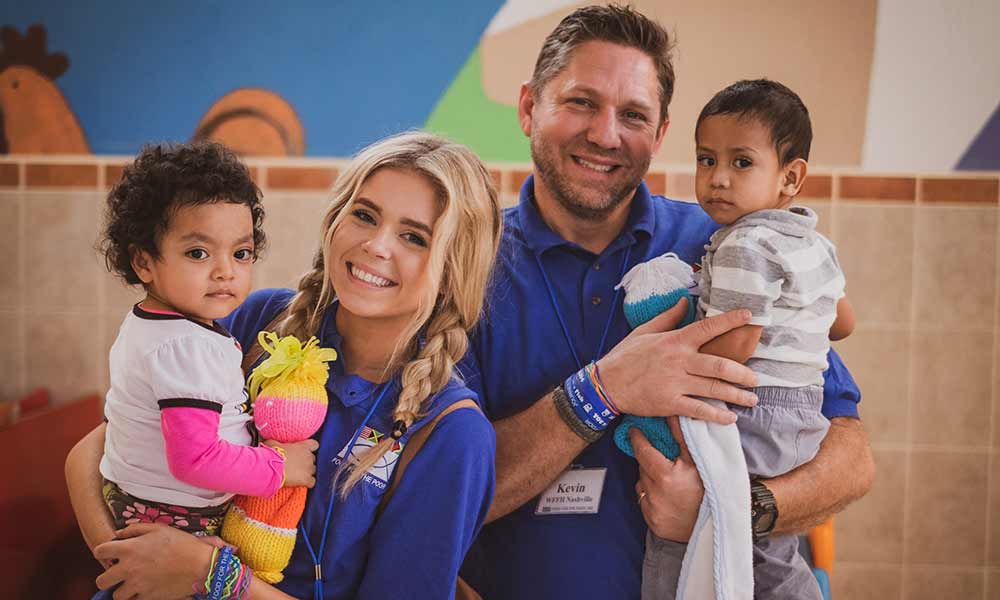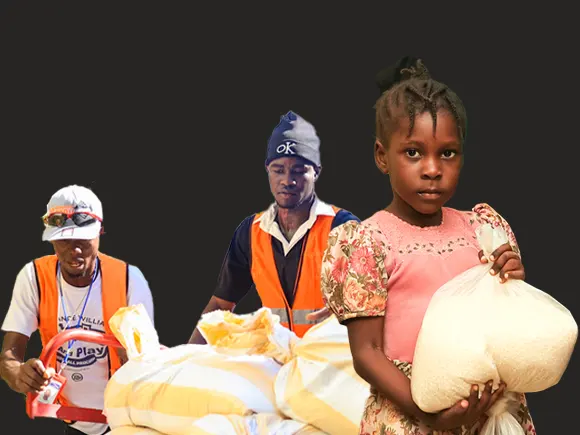Not long before our world was consumed by news of the coronavirus, 16-year-old Natalie Anderson traveled to Guatemala with Food For The Poor’s Radio Media team.
The best experiences in my life often come as surprises, out of thin air, and my journey to Guatemala alongside Food For The Poor was no different.

The opportunity to take part in this life changing experience arose when my dad, Kevin Anderson, approached me after school asking if I’d be interested in going on a mission trip. My heart skipped a beat at the thought. Ever since I had been a child, I wanted to go on a mission trip, meet people, share God’s message, and hopefully bring some light to someone’s life. However, the opportunity never really presented itself, until I found out about Food For The Poor’s upcoming trip.
Soon after we received confirmation about joining the trip, my dad and I began to plan. However, no planning could prepare us for the conditions we witnessed in Guatemala.
When my group of roughly seventeen arrived to Guatemala, my dad and I were hit with a bit of “jetlag,” which I had never really experienced. The crazy thing is that this would only be the first of many new experiences. We made sure to get good sleep that night, for we had a long day ahead of us.
We woke up bright and early that next morning, about four a.m. to be precise. Now I may try to be an early bird and put a smile on my face, but it is a little difficult for a high school junior to wake up when the sun’s not even out yet. We ate breakfast, and our bus made its way to Los Pireres.
On the trip there, I took in all of the details of this country that was so foreign to me. Guatemala City intrigued me to a point beyond belief, and to this day I wish to go back and immerse myself in the culture. However, there was still poverty present in the city. Ghostly thin stray dogs roamed the streets, men would walk through traffic just to ask for money, and a man even dressed as a clown and performed magic tricks at red lights for spare change.

As we journeyed further and further away from the city life, we started to notice a change in scenery and even clothing. Women walked balancing baskets on their heads with ease, whilst holding a child’s hand. Elderly men slept on the side of the road, inches away from oncoming cars. The streets were no longer streets, but rough and bumpy dirt trails just wide enough to allow two passing cars.
After about two and a half hours of driving, we made it to Los Pireres. My nerves hit a peak when we got out of the car. It was extremely quiet, and my thoughts raced. I started to think about the fact that I knew no Spanish, other than the common phrases, and feared that I wouldn’t be able to share my heart with these people.
We walked into the first “house.” I use the word house lightly because its dirt floors held a family of nine, who all had to sleep on a bed half the size of a twin bed. Smoke filled the room due to lack of ventilation. The humidity and heat permeated through the room.
After taking notice of the conditions themselves, I was soon greeted by the sweetest eyes from across the room, or across the house. Marta, nine, Marelly, eight, and Jeimy, three, all looked right at me while holding their mother’s dress and hands. Once they broke away from her, I crouched down and began to give them the goodies I had in my bag. Stickers, silly bands, and little hacky sacks all found their way into the hands of these beautiful babies, and my heart sang.
Their mother, Marta Feliciano, at the same time, was telling us of the troubles she endures. The house itself is four miles from any doctor, and these children were constantly sick, likely due to unclean water and malnutrition. The water they do receive, is a twenty- minute walk both ways, which Marta Feliciano has to get up at four a.m. just to retrieve the water, and if she does not, the family does not drink. This information snapped me into the reality that is their daily lives, and from that point forward, I knew I would have to share this message back at home.
The second house we visited was not much stronger or more comfortable. The roof was held up by a single branch, and you could physically see areas where the roof could cave in at any given moment. I surveyed the room for the children so that I could give them stickers and bracelets, just as I had before.

Just then, I noticed a little girl. I knelt down to this girl, named Jimena, and smiled at her and gave her any choice of any stickers and bracelets she wanted. She smiled softly and thanked me, then ran away to play.
We walked into the house where we talked with Mirna Yolanda, Jimena and Quevin’s mother. Then, I felt a tugging on my pants leg. Little Jimena was beckoning me to follow her. She stopped at her bed, and ran to the opposite side of the room, grabbed a small bag, and came back to me. She propped herself onto the bed and pulled out all sorts of small trinkets.
She started showing me her cat’s cradle skills, which if I do say so myself, were quite flawless. Jimena even tried her best to show me how to do it as well, but I cannot say I was as good as her. Then, she did something that threw me for a loop. She took out two of her very own stickers that she had received from somewhere or someone else and placed them onto my hands. This small act of love and generosity was my God “AHA” moment. This little baby girl, who has nothing, not even a room to herself, was sharing with me. That in her poverty, in her lack of, she was ready and willing to give me joy. And that right there, is when I realized that we must all do everything we can do be like Jimena. That in our abundance, we should give. In our plenty, we should seek out those in need, and share our hearts and plenty, to provide joy to the joyless, help to the helpless, and home for the homeless.


